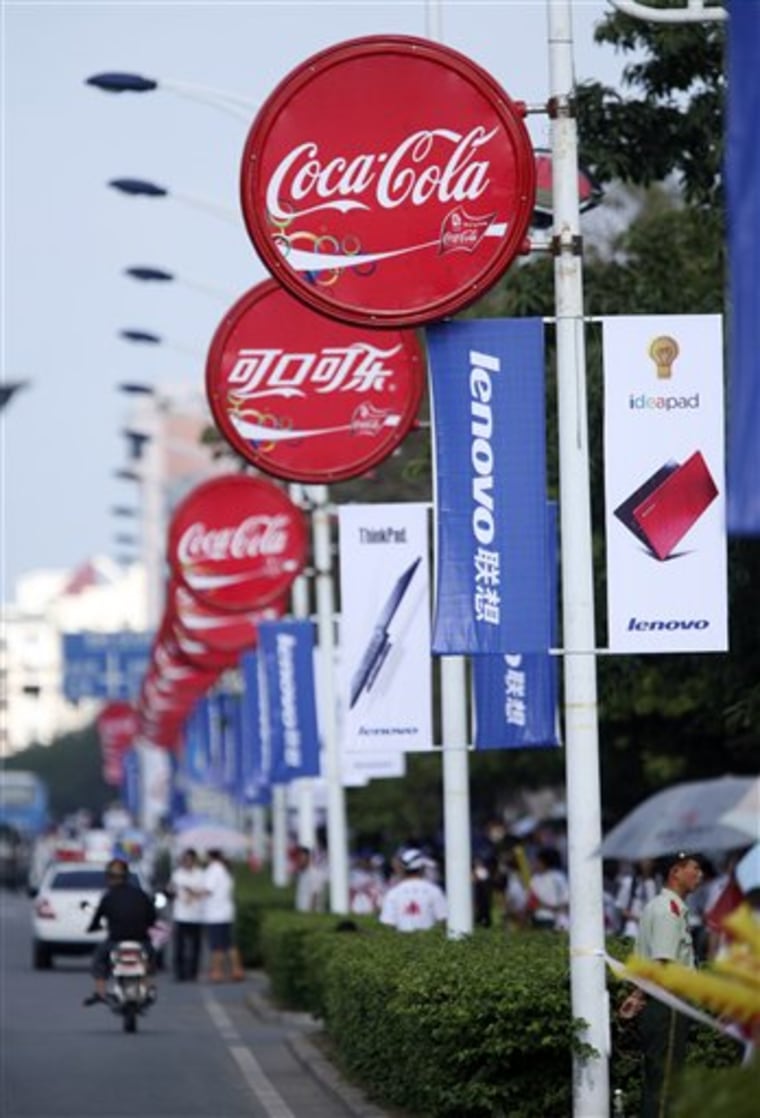As protests flared along the Olympic torch route, games sponsor BHP Billiton Ltd. set up a very different clash of its own: A basketball game against one of the Australian miner's key Chinese customers.
The match was part of a family day with 800 children of Maanshan Iron & Steel Co. employees, one of a series of Olympic-themed BHP events meant to nurture ties with Chinese customers and officials.
"This country is critical to our business," said Karen Wood, a BHP Billiton group executive. As for activism over China's rule in Tibet and other issues, she said, "It certainly hasn't changed our expectation of what we're going to get out of the games."
Companies that are spending millions of dollars to tie their brands to the games have faced daunting public relations challenges, coping with security concerns, public anguish over the toll from the May 12 earthquake in China, Tibet protests and pressure from activists who want them to press Beijing to help end bloodshed in ally Sudan's Darfur region. But they are pushing ahead with ambitious marketing plans, confident they will get the boost they want, especially in China's fast-growing domestic market.
Torch relay sponsors Coca-Cola Co., Lenovo Group and Samsung Electronics Corp. cut back marketing abroad after Tibet activists tried to disrupt the run. UPS Inc. canceled a media tour of its Olympic cargo-handling facility in April after Chinese officials barred reporters from the building. Adidas scrapped plans for a hospitality center and interviews with its athletes, blaming logistical problems, though it says its Olympic pavilion will provide a high-profile platform.
But others including General Electric Co. and McDonald's Corp. say plans to promote themselves in China and abroad are moving ahead unchanged.
And once the Olympic torch hit the road in China, the relay sponsors sent truckloads of mini-skirted cheerleaders to entertain spectators and handed out corporate logo-emblazoned T-shirts and noisemakers. Festivities were toned down again as China plunged into mourning following the deadly earthquake, though the route is still lined with sponsors' billboards.
Companies are eager to target Chinese consumers in a market where retail spending is growing at more than 20 percent per year. And BHP, GE and others also are working in less visible ways to use the games to woo Chinese officials and corporate customers.
GE is supplying water and power systems for Olympic venues and plans to showcase its technology by inviting hundreds of Chinese officials and potential customers.
"We think the Beijing Olympics will be a great success," said a GE spokeswoman, Deirdre Latour, when asked whether political strains might tarnish the games' marketing value.
Sponsors also could earn valuable political capital with Chinese officials for having stuck by the Beijing games through the protests.
Coca-Cola faced a potential setback after the earthquake when critics on Chinese Web sites accused it and other foreign companies of failing to do enough for survivors and dubbed them "international misers." But Coca-Cola, which gave money and bottled water for quake relief, got a boost when China's commerce minister publicly thanked corporate donors for their generosity.
Activists are pressing sponsors to lobby Beijing to use its influence with ally Sudan to help end bloodshed in the country's Darfur region. Companies have expressed concern but say they should avoid politics.
Sponsors still are vulnerable to possible missteps that might alienate consumers in China or abroad, especially as corporate spokespeople and athletes start talking to reporters ahead of the Aug. 8 opening of the games, said Damien Ryan, a Hong Kong-based consultant on media strategy. Ryan said he is advising several sponsors but declined to identify them.
"This is when really tough questions are going to be asked," Ryan said. "A wrong response, a poorly worded statement to the media or the inability to answer some of these questions clearly and concisely may lead to vulnerability and potential holes in their marketing."
Still, Ryan said, looking at the Olympics' popularity in China, "I think a lot of sponsors are now realizing they are partnering with success."
Adidas AG, a top Beijing sponsor, and its Reebok unit scrapped plans for a joint hospitality center at a private school and interviews with their athletes.
The change was due to "changing logistical and practical challenges," said Reebok spokeswoman Josie Stevens. She refused to give details but denied it was prompted by political concerns.
Asked whether Reebok was trying to avoid having athletes face questions about Tibet, Darfur or other issues, she said, "We neither prevent nor encourage our athletes from expressing their personal views."
France's Atos Origin SA, which is handling data-processing for the games, plans to bring in potential Chinese corporate and government clients to demonstrate its services, said Patrick Adiba, the company's executive vice president for the Olympics.
And the effect on the company of political activism?
"Our customers don't even mention it," Adiba said.
BHP has held 110 Olympic-themed events over the past two years in places as far-flung as Australia's tiny Groote Island and Mozambique in East Africa, with basketball and volleyball games and appearances by former Olympians. In China, the company plans to hold eight events with local corporate partners and major customers.
Lenovo is supplying computers for the games, which will showcase its technology before a global audience, said spokesman Robert J. Page.
"We don't see any slowing down in how we position ourselves and use this as an example of what we can do," Page said. Asked whether Lenovo worried that political issues might undercut that, he said, "we certainly don't see that taking place."
